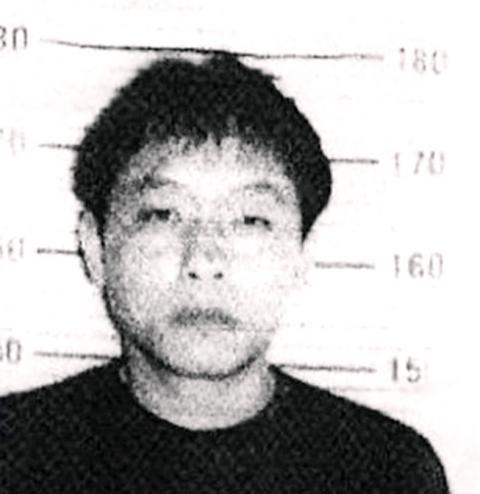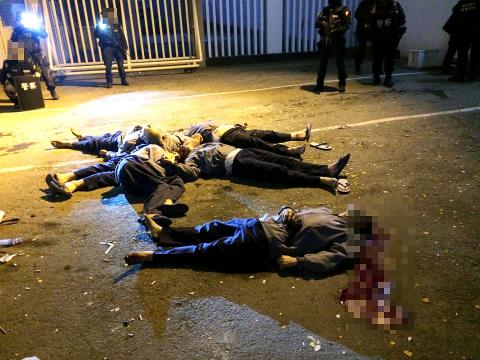Following Wednesday’s failed jailbreak attempt at Kaohsiung Prison, questions have been raised about the background of Cheng Li-te (鄭立德), the purported ringleader of the escape attempt who ended the 14-hour-long hostage standoff by shooting himself.
Cheng, 45, was a member of the Bamboo Union (竹聯幫) triad with a long criminal record. He was arrested in August 2012 in Kaohsiung and was serving a 28-and-a-half-year prison term for multiple offenses including abetting murder and illegal weapons possession.
A man who said he knew Cheng for more than 25 years and gave his surname as Chen (陳) said Cheng had married twice and had three children, the eldest of whom is 20 years old and the youngest five.

Photo: CNA
“Cheng and I were not very close, but I had always admired him for his courage to take responsibility for whatever he did,” Chen said.
Chen said one of the charges against Cheng was false, saying that Cheng was not guilty of abetting a murder five years ago.
Cheng was convicted of the crime and sentenced to 18 years in prison.

Photo: Huang Chien-hua, Taipei Times
“Cheng was a fierce person. He would definitely admit to the crime if he truly was the one responsible for the murder. However, if someone fell down on the street and died, you cannot frame him,” Chen said.
Elaborating on the incident, Chen said one of Cheng’s underlings killed someone after drinking at the same table with Cheng. The man was sentenced to 16 years in prison, while Cheng was imprisoned for doing nothing, Chen said.
“Even after he was thrown behind bars, Cheng was indignant whenever someone brought up the matter,” Chen added.

Photo: Fang Chih-hsien, Taipei Times
Chen also dismissed speculation that Cheng was the ringleader, saying that as Cheng’s term was the second-shortest among the six would-be escapees, he had no reason to mastermind the action.
The other prisoners, who also committed suicide, were serving terms ranging from 25 years to life for burglary, drug possession and other offenses.
Pingtung County Police Bureau’s First Investigation Platoon commander Shih Chia-hung (石加宏), who participated in Cheng’s 2012 arrest, described the convict as a truculent gangster.
“At the time [of his arrest], Cheng had two handguns on him, but he did not draw them when we identified ourselves as police. However, he still fiercely resisted arrest and grappled with us,” Shih said.
Cheng gave off a “strong badass vibe,” Shih said.
Fearing an escape attempt, Shih never brought Cheng into the police station for questioning.
“Instead, we always questioned Cheng inside the detention center where he was being kept,” he said.

Alain Robert, known as the "French Spider-Man," praised Alex Honnold as exceptionally well-prepared after the US climber completed a free solo ascent of Taipei 101 yesterday. Robert said Honnold's ascent of the 508m-tall skyscraper in just more than one-and-a-half hours without using safety ropes or equipment was a remarkable achievement. "This is my life," he said in an interview conducted in French, adding that he liked the feeling of being "on the edge of danger." The 63-year-old Frenchman climbed Taipei 101 using ropes in December 2004, taking about four hours to reach the top. On a one-to-10 scale of difficulty, Robert said Taipei 101

Nipah virus infection is to be officially listed as a category 5 notifiable infectious disease in Taiwan in March, while clinical treatment guidelines are being formulated, the Centers for Disease Control (CDC) said yesterday. With Nipah infections being reported in other countries and considering its relatively high fatality rate, the centers on Jan. 16 announced that it would be listed as a notifiable infectious disease to bolster the nation’s systematic early warning system and increase public awareness, the CDC said. Bangladesh reported four fatal cases last year in separate districts, with three linked to raw date palm sap consumption, CDC Epidemic Intelligence

Two Taiwanese prosecutors were questioned by Chinese security personnel at their hotel during a trip to China’s Henan Province this month, the Mainland Affairs Council (MAC) said yesterday. The officers had personal information on the prosecutors, including “when they were assigned to their posts, their work locations and job titles,” MAC Deputy Minister and spokesman Liang Wen-chieh (梁文傑) said. On top of asking about their agencies and positions, the officers also questioned the prosecutors about the Cross-Strait Joint Crime-Fighting and Judicial Mutual Assistance Agreement, a pact that serves as the framework for Taiwan-China cooperation on combating crime and providing judicial assistance, Liang

US climber Alex Honnold left Taiwan this morning a day after completing a free-solo ascent of Taipei 101, a feat that drew cheers from onlookers and gained widespread international attention. Honnold yesterday scaled the 101-story skyscraper without a rope or safety harness. The climb — the highest urban free-solo ascent ever attempted — took just more than 90 minutes and was streamed live on Netflix. It was covered by major international news outlets including CNN, the New York Times, the Guardian and the Wall Street Journal. As Honnold prepared to leave Taiwan today, he attracted a crowd when he and his wife, Sanni,